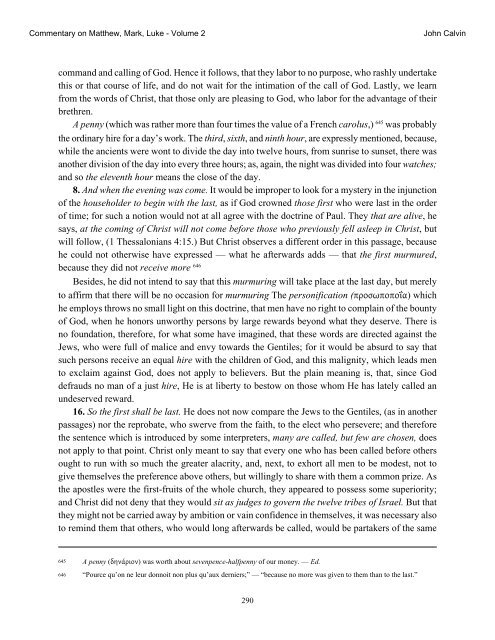Commentary on Matthew, Mark, Luke - Volume 2.pdf
Commentary on Matthew, Mark, Luke - Volume 2.pdf
Commentary on Matthew, Mark, Luke - Volume 2.pdf
You also want an ePaper? Increase the reach of your titles
YUMPU automatically turns print PDFs into web optimized ePapers that Google loves.
<str<strong>on</strong>g>Commentary</str<strong>on</strong>g> <strong>on</strong> <strong>Matthew</strong>, <strong>Mark</strong>, <strong>Luke</strong> - <strong>Volume</strong> 2<br />
command and calling of God. Hence it follows, that they labor to no purpose, who rashly undertake<br />
this or that course of life, and do not wait for the intimati<strong>on</strong> of the call of God. Lastly, we learn<br />
from the words of Christ, that those <strong>on</strong>ly are pleasing to God, who labor for the advantage of their<br />
brethren.<br />
A penny (which was rather more than four times the value of a French carolus,) 645 was probably<br />
the ordinary hire for a day’s work. The third, sixth, and ninth hour, are expressly menti<strong>on</strong>ed, because,<br />
while the ancients were w<strong>on</strong>t to divide the day into twelve hours, from sunrise to sunset, there was<br />
another divisi<strong>on</strong> of the day into every three hours; as, again, the night was divided into four watches;<br />
and so the eleventh hour means the close of the day.<br />
8. And when the evening was come. It would be improper to look for a mystery in the injuncti<strong>on</strong><br />
of the householder to begin with the last, as if God crowned those first who were last in the order<br />
of time; for such a noti<strong>on</strong> would not at all agree with the doctrine of Paul. They that are alive, he<br />
says, at the coming of Christ will not come before those who previously fell asleep in Christ, but<br />
will follow, (1 Thessal<strong>on</strong>ians 4:15.) But Christ observes a different order in this passage, because<br />
he could not otherwise have expressed — what he afterwards adds — that the first murmured,<br />
because they did not receive more 646<br />
Besides, he did not intend to say that this murmuring will take place at the last day, but merely<br />
to affirm that there will be no occasi<strong>on</strong> for murmuring The pers<strong>on</strong>ificati<strong>on</strong> (προσωποποΐα) which<br />
he employs throws no small light <strong>on</strong> this doctrine, that men have no right to complain of the bounty<br />
of God, when he h<strong>on</strong>ors unworthy pers<strong>on</strong>s by large rewards bey<strong>on</strong>d what they deserve. There is<br />
no foundati<strong>on</strong>, therefore, for what some have imagined, that these words are directed against the<br />
Jews, who were full of malice and envy towards the Gentiles; for it would be absurd to say that<br />
such pers<strong>on</strong>s receive an equal hire with the children of God, and this malignity, which leads men<br />
to exclaim against God, does not apply to believers. But the plain meaning is, that, since God<br />
defrauds no man of a just hire, He is at liberty to bestow <strong>on</strong> those whom He has lately called an<br />
undeserved reward.<br />
16. So the first shall be last. He does not now compare the Jews to the Gentiles, (as in another<br />
passages) nor the reprobate, who swerve from the faith, to the elect who persevere; and therefore<br />
the sentence which is introduced by some interpreters, many are called, but few are chosen, does<br />
not apply to that point. Christ <strong>on</strong>ly meant to say that every <strong>on</strong>e who has been called before others<br />
ought to run with so much the greater alacrity, and, next, to exhort all men to be modest, not to<br />
give themselves the preference above others, but willingly to share with them a comm<strong>on</strong> prize. As<br />
the apostles were the first-fruits of the whole church, they appeared to possess some superiority;<br />
and Christ did not deny that they would sit as judges to govern the twelve tribes of Israel. But that<br />
they might not be carried away by ambiti<strong>on</strong> or vain c<strong>on</strong>fidence in themselves, it was necessary also<br />
to remind them that others, who would l<strong>on</strong>g afterwards be called, would be partakers of the same<br />
645 A penny (δηνάριον) was worth about sevenpence-halfpenny of our m<strong>on</strong>ey. — Ed.<br />
646 “Pource qu’<strong>on</strong> ne leur d<strong>on</strong>noit n<strong>on</strong> plus qu’aux derniers;” — “because no more was given to them than to the last.”<br />
290<br />
John Calvin

















